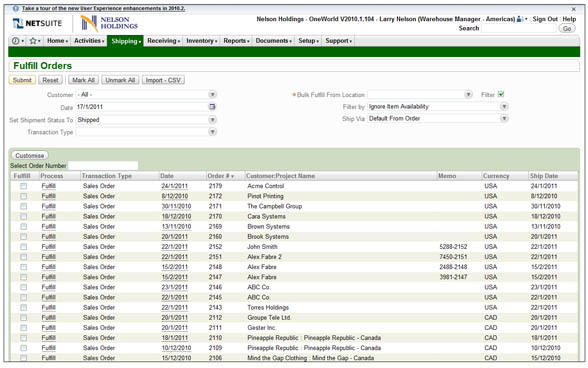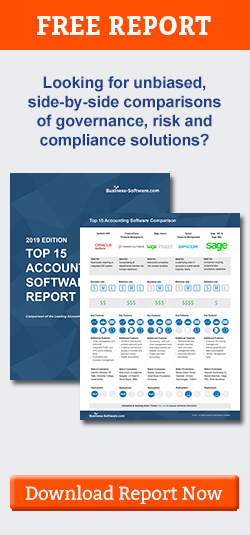Browse Business Software Categories
ACCOUNTING
ERP
FINANCIAL MANAGEMENT
NetSuite ERP Review
Product Snapshot
Product Pricing
Contact vendor directly for pricing information.
Technology
NetSuite ERP’s cloud delivery allows businesses to run their financial management processes without needing to sustain on-premise IT resources and infrastructure. With SAS 70 Type II, PCI DSS and US-EU Safe Harbor certifications, NetSuite delivers a high level of compliance and security.
Customer Focus
Over 33,000 midsize and high-growth companies, as well as divisions of large enterprises, use NetSuite to run their business. NetSuite’s ERP software is also applicable to any industry type. Their customers range from insurance providers to retail restaurant chains to online retailers, demonstrating the flexibility of their solution. NetSuite’s diverse array of customers come from a variety of industries, such as financial services, media/publishing, telecom, nonprofit, manufacturing, retail, wholesale distribution and more.
Select Customers
Western Global, PetShop.co.uk, P3 Medical, VivoBareFoot
About NetSuite ERP
 NetSuite ERP integrates with existing web and CRM investments, providing a cloud financial management solution that’s woven into a company’s broader business systems. Additionally, users can easily scale into NetSuite’s other solutions by adding NetSuite CRM, Ecommerce, Professional Services Automation or global business management capabilities whenever businesses find the need for those solutions.
NetSuite ERP integrates with existing web and CRM investments, providing a cloud financial management solution that’s woven into a company’s broader business systems. Additionally, users can easily scale into NetSuite’s other solutions by adding NetSuite CRM, Ecommerce, Professional Services Automation or global business management capabilities whenever businesses find the need for those solutions.
NetSuite ERP delivers specific industry editions for wholesale distributors or manufacturers with multi-site production and inventory, software companies with complicated revenue recognition requirements, professional services organizations and more.
About the Company
NetSuite was founded in 1998 and has its headquarters in San Mateo, CA. Its nine offices span the globe, with locations in Europe, Canada, Australia and Asia. Gartner named NetSuite one of the top 10 fastest-growing financial management solutions, and they’ve received four CODiE Awards from the Software and Information Industry Association in the past two years.
NetSuite ERP Key Features
Financial Management
- Complete financial visibility into payables, receivables and real-time access to outstanding bills and invoices
- One-click invoice generation from sales orders
- Helps you comply with GAAP, AICPA, FASB and SEC regulations
- Continuously maintain an audit trail on entries and changes in order to ensure financial compliance
- Currency management tools and automated allocations
- Always up to date and doesn’t require sub-ledgers
- Track and manage non-depreciating or depreciating company assets
- Supports standard depreciation methods and has unlimited custom depreciation methods
- Post depreciation and asset retirements directly to NetSuite
- Comprehensive assets, valuation and depreciation reporting
- Real-time dashboards with expense, receivables metrics, key revenue and more
- Optimize cash management, analysis, reporting and allocation at the subsidiary and corporate level
- Leverage over 100 standard reports or create and define your own financial reports, depending on your business needs
- Efficient payment acceptance; streamlined and integrated order-to-payment and payment-to-reconciliation processes
- Full PCI compliance and fraud prevention tools
- Streamlined billing and automated order-to-cash process
- Streamlined workflows and end-to-end management for procure-to-pay processes
- Ensures that all users across departments are working with the same customer, sales and financial data
Supply Chain and Inventory Management
- Real-time visibility into inventory control and supply chain management measures
- Increase product margins by managing pricing depending on the type of customer, channel and currency
- Better management of inventory replenishment
- Extensive inventory management software features: bin and lot management, demand-based replenishment, landed cost, multi-location inventory, customer and volume pricing and more
- Online purchase order creation
- Give vendors self-serve access to important data and information
- Create complete business process flows through receiving, purchasing and account payables
- Efficiently manage production work orders, create special purchase orders for components, build multi-level assemblies and integrate with back-office operations
- Industry manufacturing solutions also available from SuiteApp.com
- Calculate demand plans by leveraging historical data and sales forecasts
- Determine how projected sales and purchase orders affect your future inventory levels
- Calculate supply plans and automatically generate purchase or work orders
Order and Billing Management
- Total quote-to-order-to-cash business process integration across sales, finance and fulfillment
- Centralized management of quotes and orders reduces errors
- Ensures that sales quotes based on latest pricing and discounting rules, and raise order size by incorporating up-sell management
- Out-of-the-box integration with USPS, FedEx and UPS allows you to automate shipping processes
- Route orders electronically to suppliers for shipping
- Integration between order management and return merchandise authorization (RMA) improves the return process
- Integrate the quote-to-order-to-bill process to enable quicker billing and greater accuracy
- Centralized customer, invoice and order records eliminates errors
- Monitor orders and Reduce DSO through detail reports and real-time dashboards
- Automate invoicing and complex recurring, time and project-based billing
- Provide customers with self-service access for orders, delivery status and payment and demographic information
- Allow customers to manage their own bills and payment information online, thus reducing customer calls
Revenue Recognition Management
- Includes SOP 81-1, SAB 101, EITF 00-21, EITF 08-01 and EITF 09-03
- Monitor and support “units of accounting” and selling price (VSOE, TPE or ESP) for all elements of multiple-element arrangements
- Deliver automatic reallocation of order value to each line item
- Assign flexible and customizable schedules on a per-item basis
- Track and manage multiple Estimated Selling Prices (ESPs) for every SKU
- Compare current trending actual selling prices versus Estimated Selling Price, and get exception reporting for data integrity
- Support revenue recognition schedules for all sales transactions
- Receive immediate notification when revenue is due to be recognized
- Recognize revenue as a job is completed
- Flexibly recognize revenue using a separate process from billing, or use an integrated workflow for simultaneous revenue recognition and billing
- Manage one-off and recurring billing processes for subscription and maintenance-based revenue streams
- Gain multi-currency and multi-subsidiary business intelligence
- Deploy and integrate with your existing ERP system such as Oracle Financials, SAP R/3 or another third-party ERP system
- Import orders and invoices from your ERP for revenue recognition calculation and reporting, as well as export journal entries back into your ERP system’s general ledger
- Use templates to classify revenue-recognition methods and apply them at your invoice’s line-item level
- Associate templates to goods or services for associated recognition rules to apply when those goods or services are sold
- Use pre-packaged templates or create your own custom ones
- Monitor your recognized revenue with real-time dashboards
- Generate key reports like deferred revenue by customer, revenue recognition forecast or item and revenue by customer or item
- Examine breakouts of recognized revenue across various elements
- Clear view into Estimated Selling Prices
- See transaction-level details, ensuring correct reporting of your financials
- Monitoring of variances between things like Estimated Selling Price and Actual Sales Price
- Revenue and deferred revenue reporting with analytics by region, product line and more
Financial Planning
- Intuitive, spreadsheet-like data entry sheets
- Multi-dimensional data collection
- Automated consolidation and roll-up of plans
- Dynamic formulas and assumptions
- Actuals data incorporated into new forecasts
- Workflow management
- Planning of full financial statements (such as income statements, balance sheets and cash flow statements)
- Unlimited versions for “what-if” analysis
- Multi-dimensional models for complex sales and product planning
- Financial and operational accounts and metrics
- User-based access controls and customized sheets
- Budget in multiple currencies
- Localized in French, German, Spanish and Japanese
- Graphical “drag-and-drop” report builder
- Multi-dimensional analysis with automatic security filtering
- Multi-version variance reporting (e.g. actual vs. plan vs. forecast)
- Drill through into NetSuite real-time actuals data
- Discussion groups for managing ongoing communications about planning
- Collaborative online documents for centrally capturing non-numeric planning information
- Attachments for archiving documents and other files associated with plans
Human Capital Management
- Allow employees to create purchase orders, submit expense reports and submit and track timesheets
- Group-calendaring, calendar sharing and schedule development for every project and activity
- Premier Payroll Service is a full-service solution for payroll management, handling filings and deposits for local, state and federal jurisdictions
- Comes with NetSuite’s “No Penalties Guarantee”
- Accurate and up-to-date visibility into summary and detail commissions for your sales team
- Guarantee the best return on sales incentive budgets with reports and dashboards that analyze sales success and incentive spend
- Decrease commission errors and introduce new sales commission plans
- Build one-off sales incentives
- Send approved commissions to your payroll department automatically
Recurring Revenue Management
- Manage recurring revenue-based billing processes
- Pre-built integration of billing processes with all back-office functions, including order management, accounts receivable and general ledger
- Built-in CRM capabilities let customers sign up easily
- Price and quote management capabilities
- Multi-currency management with automated currency rate updates
- Accommodates multiple tax schedules for local taxes across subsidiaries, GST, VAT, consumption tax, general sales tax and more
- Built-in billing and revenue recognition functionality
- Dashboards and reporting across all business functions—sales, service, finance and operations
- 360-degree cross-functional view of customers through role-based dashboards
- Centralized customer data
- Configure commission rules based on quotas, sales, quantity and more
- Real-time views into customers’ previous purchases
- Automated up-sell recommendations
- Strong sales incentive compensation management to balance customer acquisition with up-selling/cross-selling, to enable the roll-out of SPIFs and to up-sell/cross-sell sales plans
Financial Analytics and Reporting
- Communicate information effectively, quickly and in real time
- Monitor important financial measures through key performance indicators (KPIs)
- Personalized visibility into billings, bookings, receivables, actual vs. budget and actual vs. forecast, period-on-period performance and more
- Provide team members with the latest information as part of their day-to-day tasks
- Drill down to the live underlying transaction or customer record from any report or indicator. For example: drill down from days sales outstanding (DSO) measures to an aging report, and then to the underlying invoice and customer information.
- Take advantage of over 100 standard reports
- Create and define customized financial reports
- Email, export or share reports in multiple formats (i.e. PDF, Excel, Word)
- Ad-hoc analysis so you don’t have to wait on IT to supply reports
- Select the subject area, lay out reports and add to your daily dashboard or share them with colleagues
- Secure access to financial performance from anywhere with an Internet connection
- Get the most up-to-date financial and operational measures around business performance
- NetSuite’s budgeting, planning and “what-if” financial modeling capabilities eliminate spreadsheets
- Real-time, end-to-end business management solution for planning, strategy and execution
- Classify variances between plans and actuals, isolate organizations and accounts responsible for variances and drill into the transactions contributing to variances
NetSuite ERP Screenshots
NetSuite ERP Videos

Pros
- Flexible online dashboards
- Cloud-based solution
- Variety of industry specific solutions
- Robust enterprise-wide integrated system
Cons
- Reportedly difficult to learn and use
- Low customer support ratings
- Customer support costs are high
Overall
The strengths in NetSuite’s ERP offering lie within its flexible online dashboards that allow a high level of customization, ensuring that your ERP system is tailored specifically for your business needs. This cloud based solution comes in a variety of industry specific solutions, which is especially helpful when building your system. Additionally, NetSuite ERP integrates with other business solutions, not just those from NetSuite.
However, all that customization, while attractive, does lend a certain difficulty-of-use to NetSuite’s ERP system. According to various reports, it’s not an easy system to learn, and it requires a great deal of training. That’s not helped by the fact that NetSuite’s customer support costs are rather high, not something that’s included in your subscription to their ERP services and which NetSuite customers often cite as a downside to the system.
Finally, the company has had something of a varied past with its customers, however. There have been a considerable number of complaints regarding bad customer service from NetSuite, as well as the high cost of customer support. In recent years, complaints have dropped off, so perhaps their support has improved; especially since they’re switching their focus away from SMBs to enterprises, which seems to be the market they’re best suited to support as the company grows.
White Papers and Demos
White Paper provided by NetSuite
This white paper reviews the issues and the solutions for the multi-organizational enterprise to manage both its sales and financial components, including requirements for addressing differing currencies, taxation rules and local and consolidated reporting.
White Paper provided by NetSuite
Overcoming the barriers of stand-alone business applications is a major challenge to growth for companies worldwide. Learn how an expanding organization can better gain control of its business operations and increase productivity through integrating its core business management processes.
White Paper provided by NetSuite
This paper, based on the experience and best practice established by early adopters, sets out a framework for deciding on and implementing on-demand ERP within enterprises of 250 employees or more, or in divisions within a larger enterprise. The paper will examine key concerns such as data integrity in enterprise systems, maintaining compliance and ensuring proper process management, as well as discussing new skills and approaches to help maximize returns on investment.















